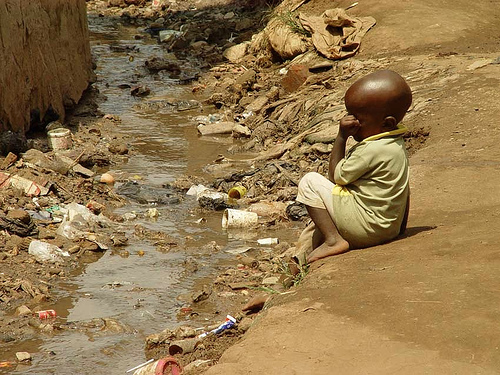- Health and hygiene, schools and other non-household settings
- Health issues and connections with sanitation
- Neglected tropical diseases (NTDs), intestinal worm infections (helminthiases)
- WHO strengthens focus on water, sanitation and hygiene to accelerate elimination of neglected tropical diseases
WHO strengthens focus on water, sanitation and hygiene to accelerate elimination of neglected tropical diseases
8807 views
- jannaowens
-
Less
- Posts: 4
- Likes received: 1
Re: WHO strengthens focus on water, sanitation and hygiene to accelerate elimination of neglected tropical diseases
Greetings,
I applaud the incredible effort made to shed some light on the issue of neglected tropical diseases. If there was anything further I'd wish to see, it would be a clarification of the perception that this occurs mostly in developing countries. Low income areas, yes. But working in central Mexico has shown the use of untreated wastewater for crop irrigation to be a really common practice. This is also true of other developed countries, such as China. It comes down to an issue of the existing infrastructure not handling the wastewater load of its communities, and a farmer's need to have the 'black water' rather than no water at all for crops.
The Center for Science and Democracy's Branscomb Forums by the Union of Concerned Scientists next week will include a case study of our nonprofit regarding sewage for irrigation in a Conde Nast favored city. It addresses the misconception of where this practice with sewage is occurring.
I appreciate this forum and hope to continue to learn from you
Janna Owens
www.ucsusa.org/center-science-and-democr...erships#.VfgTGRFVhBf
I applaud the incredible effort made to shed some light on the issue of neglected tropical diseases. If there was anything further I'd wish to see, it would be a clarification of the perception that this occurs mostly in developing countries. Low income areas, yes. But working in central Mexico has shown the use of untreated wastewater for crop irrigation to be a really common practice. This is also true of other developed countries, such as China. It comes down to an issue of the existing infrastructure not handling the wastewater load of its communities, and a farmer's need to have the 'black water' rather than no water at all for crops.
The Center for Science and Democracy's Branscomb Forums by the Union of Concerned Scientists next week will include a case study of our nonprofit regarding sewage for irrigation in a Conde Nast favored city. It addresses the misconception of where this practice with sewage is occurring.
I appreciate this forum and hope to continue to learn from you
Janna Owens
www.ucsusa.org/center-science-and-democr...erships#.VfgTGRFVhBf
Please Log in to join the conversation.
You need to login to reply- milli
-

- I am working in the field of environmental and sustainability issues, professionally and privately. Waste and wastewater are some of my main topics.
Less- Posts: 30
- Karma: 2
- Likes received: 6
Re: WHO strengthens focus on water, sanitation and hygiene to accelerate elimination of neglected tropical diseases
Hi!
I included the mentioned WHO references and other suggested articles in the wikipedia overview about NTDs.
Thank you, Sarah, for the additional literature.
This is, how the article looks so far:
en.wikipedia.org/wiki/Neglected_tropical...n_with_WASH_programs
Feel free to add, correct and improve the article further!
Regards,
milli
I included the mentioned WHO references and other suggested articles in the wikipedia overview about NTDs.
Thank you, Sarah, for the additional literature.
This is, how the article looks so far:
en.wikipedia.org/wiki/Neglected_tropical...n_with_WASH_programs
Feel free to add, correct and improve the article further!
Regards,
milli
Danijela Milosevic
M.Sc. Environmental and Resource Management
Gießen, Germany
M.Sc. Environmental and Resource Management
Gießen, Germany
Please Log in to join the conversation.
You need to login to reply- joeturner
-
 Less
Less- Posts: 717
- Karma: 23
- Likes received: 185
Re: WHO strengthens focus on water, sanitation and hygiene to accelerate elimination of neglected tropical diseases
Here is the link 
Water, Sanitation, and Hygiene (WASH): A Critical Component for Sustainable Soil-Transmitted Helminth and Schistosomiasis Control
journals.plos.org/plosntds/article?id=10...journal.pntd.0002651
Water, Sanitation, and Hygiene (WASH): A Critical Component for Sustainable Soil-Transmitted Helminth and Schistosomiasis Control
journals.plos.org/plosntds/article?id=10...journal.pntd.0002651
Please Log in to join the conversation.
You need to login to replyRe: Water, Sanitation and Hygiene 2015–2020 - A Global Strategy for Accelerating and Sustaining Progress on Neglected Tropical Diseases
Dear Dr. Sarah,
The link of publication no. 2 leads to the publication at no. 1.
I know, this is just an oversight. Could you kindly provide the correct link.
Regards,
F H Mughal
The link of publication no. 2 leads to the publication at no. 1.
I know, this is just an oversight. Could you kindly provide the correct link.
Regards,
F H Mughal
F H Mughal (Mr.)
Karachi, Pakistan
Karachi, Pakistan
Please Log in to join the conversation.
You need to login to replyRe: Water, Sanitation and Hygiene 2015–2020 - A Global Strategy for Accelerating and Sustaining Progress on Neglected Tropical Diseases
Dear Dr. Sarah,
Thank you for your useful, informative post. It certainly gave good insight on the issue. Now I know why are they called "neglected" diseases, though I would have preferred a different term, in place of "neglected."
The attachments are also very useful.
Regards,
F H Mughal
Thank you for your useful, informative post. It certainly gave good insight on the issue. Now I know why are they called "neglected" diseases, though I would have preferred a different term, in place of "neglected."
The attachments are also very useful.
Regards,
F H Mughal
F H Mughal (Mr.)
Karachi, Pakistan
Karachi, Pakistan
Please Log in to join the conversation.
You need to login to reply- SDickin
-

- User is blocked
- I'm a research fellow at the Stockholm Environment Institute and a geographer interested in environment health linkages, including how water and sanitation fit within the greater sustainable development agenda.
Less- Posts: 68
- Karma: 4
- Likes received: 26
Re: Water, Sanitation and Hygiene 2015–2020 - A Global Strategy for Accelerating and Sustaining Progress on Neglected Tropical Diseases
Making greater links between NTDs and WASH is definitely good to hear!
Many of these are considered 'neglected' because they are not as lethal as malaria, HIV/AIDS and TB, are often associated with chronic (rather than acute) symptoms and generally impact the poorest most marginalized populations. In the case of some NTDs (e.g. dengue) this neglect has actually led to a significant global expansion and increasing burden of illness.
In fact, some researchers have pointed out that the disability adjusted life years (DALYs) associated with some of these diseases can actually be higher than more lethal diseases. For instance, in the case schistosomiasis, this impacts child development, worker productivity and can eventually cause bladder cancer (See King, 2010). So whether the term neglected is still useful is open to debate..
In the case of schistosomiasis, which is directly linked to poor sanitation, the WHO has traditionally advocated mass drug administration in the form of chemotherapy as the cornerstone of control. This doesn't stop the transmission cycle, which is why a bigger role for WASH is so important. But how can these clinical MDA programs be best integrated with sanitation?
Ive attached some literature I have previously found helpful if anyone is interested.
Regards,
Sarah
A review highlighting a need more better evidence to support decision-makers:
The relationship between water, sanitation and schistosomiasis: a systematic review and meta-analysis.
journals.plos.org/plosntds/article?id=10...journal.pntd.0003296
A helpful discussion of this issue:
Water, Sanitation, and Hygiene (WASH): A Critical Component for Sustainable Soil-Transmitted Helminth and Schistosomiasis Control
journals.plos.org/plosntds/article?id=10...journal.pntd.0003296
King, C. 2010. PARASITES AND POVERTY: THE CASE OF SCHISTOSOMIASIS
www.ncbi.nlm.nih.gov/pmc/articles/PMC2812649/
Many of these are considered 'neglected' because they are not as lethal as malaria, HIV/AIDS and TB, are often associated with chronic (rather than acute) symptoms and generally impact the poorest most marginalized populations. In the case of some NTDs (e.g. dengue) this neglect has actually led to a significant global expansion and increasing burden of illness.
In fact, some researchers have pointed out that the disability adjusted life years (DALYs) associated with some of these diseases can actually be higher than more lethal diseases. For instance, in the case schistosomiasis, this impacts child development, worker productivity and can eventually cause bladder cancer (See King, 2010). So whether the term neglected is still useful is open to debate..
In the case of schistosomiasis, which is directly linked to poor sanitation, the WHO has traditionally advocated mass drug administration in the form of chemotherapy as the cornerstone of control. This doesn't stop the transmission cycle, which is why a bigger role for WASH is so important. But how can these clinical MDA programs be best integrated with sanitation?
Ive attached some literature I have previously found helpful if anyone is interested.
Regards,
Sarah
A review highlighting a need more better evidence to support decision-makers:
The relationship between water, sanitation and schistosomiasis: a systematic review and meta-analysis.
journals.plos.org/plosntds/article?id=10...journal.pntd.0003296
A helpful discussion of this issue:
Water, Sanitation, and Hygiene (WASH): A Critical Component for Sustainable Soil-Transmitted Helminth and Schistosomiasis Control
journals.plos.org/plosntds/article?id=10...journal.pntd.0003296
King, C. 2010. PARASITES AND POVERTY: THE CASE OF SCHISTOSOMIASIS
www.ncbi.nlm.nih.gov/pmc/articles/PMC2812649/
Dr. Sarah Dickin,
Research Fellow
Stockholm Environment Institute
Stockholm, Sweden
This email address is being protected from spambots. You need JavaScript enabled to view it.
Research Fellow
Stockholm Environment Institute
Stockholm, Sweden
This email address is being protected from spambots. You need JavaScript enabled to view it.
The following user(s) like this post: F H Mughal, milli
Please Log in to join the conversation.
You need to login to replyRe: Water, Sanitation and Hygiene 2015–2020 - A Global Strategy for Accelerating and Sustaining Progress on Neglected Tropical Diseases
According to WHO (World Health Organization), neglected tropical diseases – NTDs (I fail to understand why are they called “neglected” diseases) are a diverse group of diseases with distinct characteristics that thrive mainly among the poorest populations. The 17 NTDs prioritized by WHO are endemic in 149 countries and affect more than 1.4 billion people.
In May 2013, the 66th World Health Assembly adopted resolution WHA66.12 which calls for intensified, integrated measures and planned investments to improve the health and social well-being of affected populations. WHO is working with Member States to ensure implementation of WHA66.12.
The neglected tropical diseases, along with their causative pathogens are:
Protozoa
• Chagas disease
• Human African trypanosomiasis (sleeping sickness)
• Leishmaniases
Bacteria
• Buruli ulcer
• Leprosy (Hansen disease)
• Trachoma
• Yaws
Helminth
• Cysticercosis/Taeniasis
• Dracunculiasis (guinea-worm disease)
• Echinococcosis
• Foodborne trematodiases
• Lymphatic filariasis
• Onchocerciasis (river blindness)
• Schistosomiasis
• Soil-transmitted helminthiases
Virus
• Dengue and Chikungunya
• Rabies
WHO has recently issued a publication: “Water, Sanitation and Hygiene 2015–2020 - A Global Strategy for Accelerating and Sustaining Progress on Neglected Tropical Diseases.”
WHO says that water, sanitation and hygiene (WASH) are critical in the prevention of the neglected tropical diseases. Provision of safe water, sanitation and hygiene is one of the five key interventions within the global NTD roadmap. Yet to date, the WASH component of the strategy has received little attention and the potential to link efforts on WASH and NTDs has been largely untapped. Focused efforts on WASH are urgently needed if the global NTD roadmap targets are to be met.
It is a bit perplexing to note that, after all these years, WASH has received little attention, when it comes to the control of diseases. It is known that WASH has a great role to play in the control of diseases. Water quality and water quantity are important adjuncts. Unsafe drinking water is the cause of many diseases. Water quantity is important in diseases like eye infections and skin problems. Improper sanitation and poor hygiene aid in the development of diseases.
The publication is available at: apps.who.int/iris/bitstream/10665/182735...WC_WSH_15.12_eng.pdf
F H Mughal
In May 2013, the 66th World Health Assembly adopted resolution WHA66.12 which calls for intensified, integrated measures and planned investments to improve the health and social well-being of affected populations. WHO is working with Member States to ensure implementation of WHA66.12.
The neglected tropical diseases, along with their causative pathogens are:
Protozoa
• Chagas disease
• Human African trypanosomiasis (sleeping sickness)
• Leishmaniases
Bacteria
• Buruli ulcer
• Leprosy (Hansen disease)
• Trachoma
• Yaws
Helminth
• Cysticercosis/Taeniasis
• Dracunculiasis (guinea-worm disease)
• Echinococcosis
• Foodborne trematodiases
• Lymphatic filariasis
• Onchocerciasis (river blindness)
• Schistosomiasis
• Soil-transmitted helminthiases
Virus
• Dengue and Chikungunya
• Rabies
WHO has recently issued a publication: “Water, Sanitation and Hygiene 2015–2020 - A Global Strategy for Accelerating and Sustaining Progress on Neglected Tropical Diseases.”
WHO says that water, sanitation and hygiene (WASH) are critical in the prevention of the neglected tropical diseases. Provision of safe water, sanitation and hygiene is one of the five key interventions within the global NTD roadmap. Yet to date, the WASH component of the strategy has received little attention and the potential to link efforts on WASH and NTDs has been largely untapped. Focused efforts on WASH are urgently needed if the global NTD roadmap targets are to be met.
It is a bit perplexing to note that, after all these years, WASH has received little attention, when it comes to the control of diseases. It is known that WASH has a great role to play in the control of diseases. Water quality and water quantity are important adjuncts. Unsafe drinking water is the cause of many diseases. Water quantity is important in diseases like eye infections and skin problems. Improper sanitation and poor hygiene aid in the development of diseases.
The publication is available at: apps.who.int/iris/bitstream/10665/182735...WC_WSH_15.12_eng.pdf
F H Mughal
F H Mughal (Mr.)
Karachi, Pakistan
Karachi, Pakistan
Please Log in to join the conversation.
You need to login to reply- Elisabeth
-
Topic Author
- User is blocked
- Freelance consultant since 2012
Less- Posts: 3372
- Karma: 54
- Likes received: 932
WHO strengthens focus on water, sanitation and hygiene to accelerate elimination of neglected tropical diseases
This is really welcome news!:
"WHO strengthens focus on water, sanitation and hygiene to accelerate elimination of neglected tropical diseases"
A good compilation of links is available in the Sanitation Updates blog:
sanitationupdates.wordpress.com/2015/08/...d-tropical-diseases/
“Joint planning, resourcing and delivery of WASH interventions are key to eliminating neglected tropical diseases and in achieving many public health and human development goals” said Dr Dirk Engels, Director of the Department of Control of Neglected Tropical Diseases. “The benefits are enormous – from alleviation of suffering through improved outcomes to healthier, wealthier and happier families, communities and nations.”
I started looking at the various links and was happy to see that one of our SuSanA photos (from Ina Jurga) made it into their factsheet collection page:
www.who.int/features/factfiles/wash-ntds/facts/en/
(strangely, the photo credits got separated from the photo to the bottom of the page, at least in my broswer)
It's this photo (which has now been viewed 17,000 times in our flickr account):
 Child in slum in Kampala (Uganda) next to open sewage
by
SuSanA Secretariat
, on Flickr
Child in slum in Kampala (Uganda) next to open sewage
by
SuSanA Secretariat
, on Flickr
Anyhow, just nice to see that SuSanA got a mention here because of that photo by Ina.
Apart from that, I have my work cut out now, because I am going to add these new WHO references to the Wikipedia page on NTDs and on WASH (unless someone else gets to it sooner than I do - which would be great!):
en.wikipedia.org/wiki/WASH#Neglected_tropical_diseases
en.wikipedia.org/wiki/Neglected_tropical...n_with_WASH_programs
Regards,
Elisabeth
P.S. I have re-arranged this sub-sub category so that it now has NTDs in the title and so that we have the threads on helminth eggs measurements in a separate sub-sub-category.
"WHO strengthens focus on water, sanitation and hygiene to accelerate elimination of neglected tropical diseases"
A good compilation of links is available in the Sanitation Updates blog:
sanitationupdates.wordpress.com/2015/08/...d-tropical-diseases/
“Joint planning, resourcing and delivery of WASH interventions are key to eliminating neglected tropical diseases and in achieving many public health and human development goals” said Dr Dirk Engels, Director of the Department of Control of Neglected Tropical Diseases. “The benefits are enormous – from alleviation of suffering through improved outcomes to healthier, wealthier and happier families, communities and nations.”
I started looking at the various links and was happy to see that one of our SuSanA photos (from Ina Jurga) made it into their factsheet collection page:
www.who.int/features/factfiles/wash-ntds/facts/en/
(strangely, the photo credits got separated from the photo to the bottom of the page, at least in my broswer)
It's this photo (which has now been viewed 17,000 times in our flickr account):

Anyhow, just nice to see that SuSanA got a mention here because of that photo by Ina.
Apart from that, I have my work cut out now, because I am going to add these new WHO references to the Wikipedia page on NTDs and on WASH (unless someone else gets to it sooner than I do - which would be great!):
en.wikipedia.org/wiki/WASH#Neglected_tropical_diseases
en.wikipedia.org/wiki/Neglected_tropical...n_with_WASH_programs
Regards,
Elisabeth
P.S. I have re-arranged this sub-sub category so that it now has NTDs in the title and so that we have the threads on helminth eggs measurements in a separate sub-sub-category.
Dr. Elisabeth von Muench
Freelance consultant on environmental and climate projects
Freelance consultant on environmental and climate projects
The following user(s) like this post: JKMakowka
Please Log in to join the conversation.
You need to login to reply
Share this thread:
- Health and hygiene, schools and other non-household settings
- Health issues and connections with sanitation
- Neglected tropical diseases (NTDs), intestinal worm infections (helminthiases)
- WHO strengthens focus on water, sanitation and hygiene to accelerate elimination of neglected tropical diseases
Recently active users. Who else has been active?
Time to create page: 0.084 seconds








